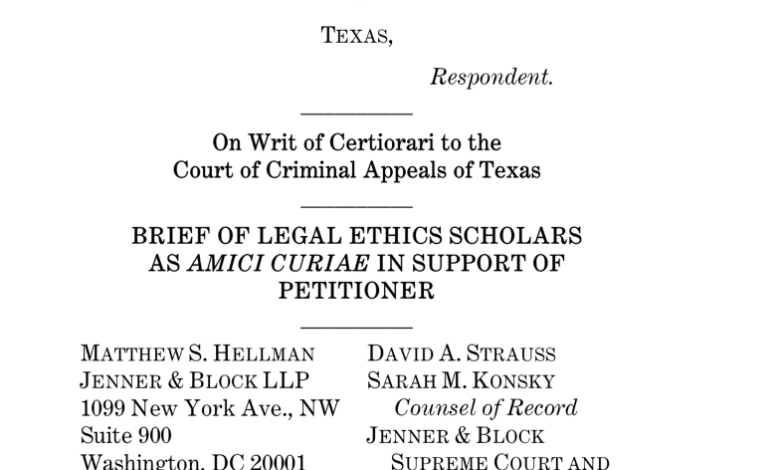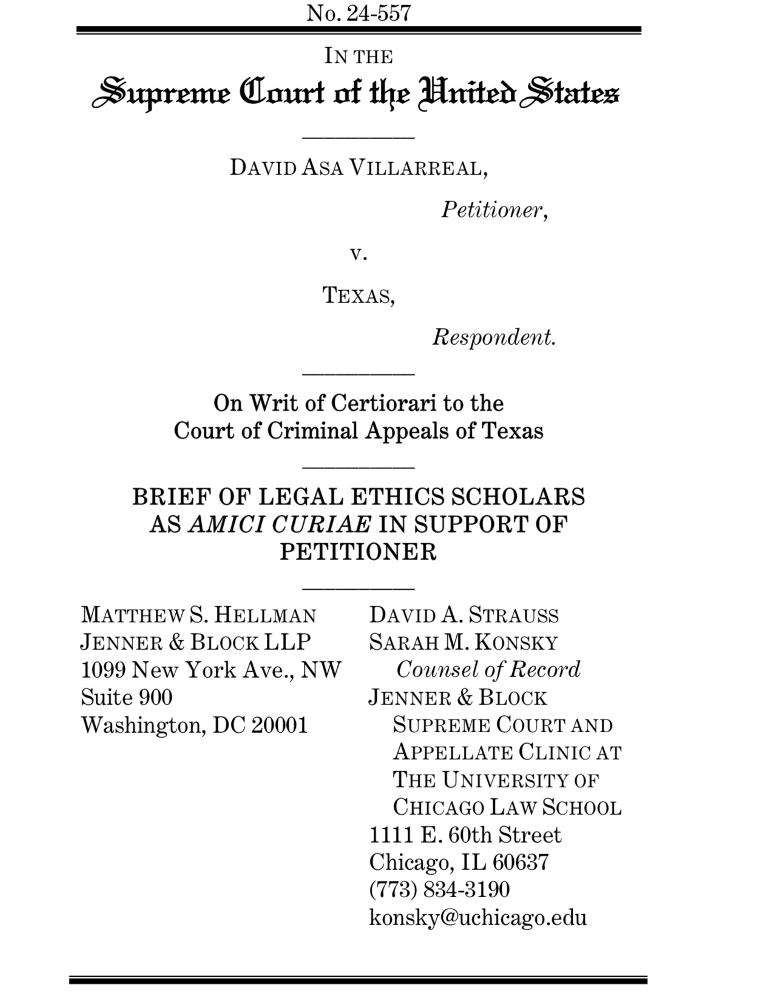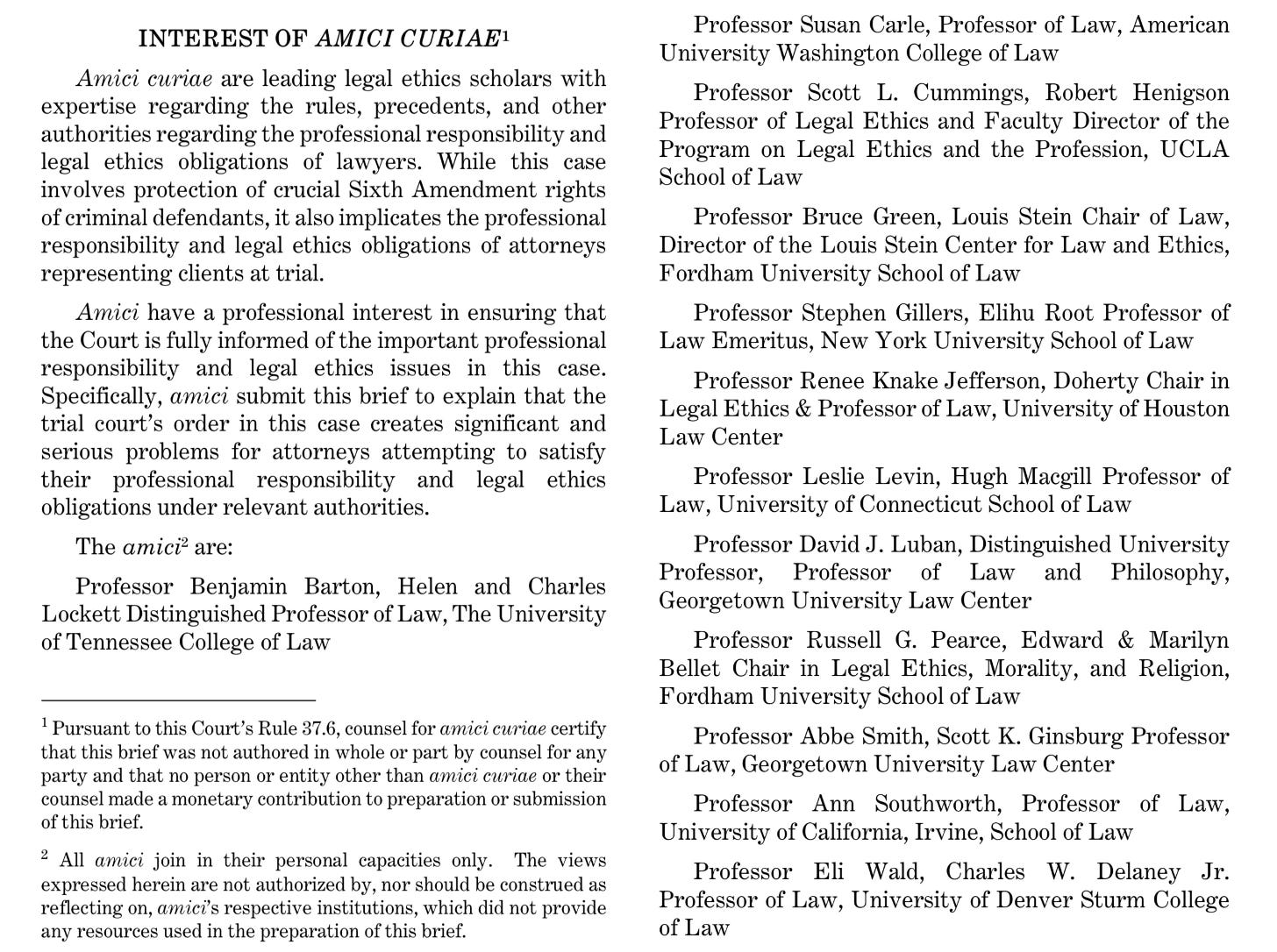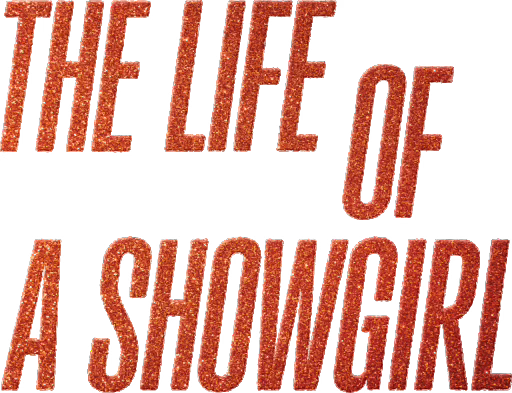Legal Ethics Roundup: SCOTUS Opens Term With Legal Ethics Argument, New Judicial Anti-Bias Rule & More

Ed. note: Please welcome Renee Knake Jefferson back to the pages of Above the Law. Subscribe to her Substack, Legal Ethics Roundup, here.
Welcome to what captivates, haunts, inspires, and surprises me every week in the world of legal ethics.
Happy First Monday! On the first Monday of each month, you get a longer version of the Roundup with the headlines plus reading recommendations, job postings, events, and many other features. The first Monday in October is extra special because it is also the opening day for the U.S. Supreme Court’s 2025 Term.
In 2010, I wrote a law review article called “The Supreme Court’s Increased Attention to the Law of Lawyering: Mere Coincidence or Something More?” I described what has turned out to be the high-water mark for cases involving legal ethics issues taken up by the Supreme Court in a particular term. There were seventeen — seventeen! — such cases during the 2009 Term. You can read the full article here if you want to know more about the cases from the 2009 Term.
But what about the Supreme Court’s docket for the upcoming term? So far we have only one. But to be fair the Court has only granted cert to a few dozen cases to date. I’ll be keeping an eye out. For now, here’s an overview of Villarreal v. Texas, which will be argued today. Along with several other legal ethics scholars, I joined an amicus brief filed in this case. At issue is whether a trial court violates a defendant’s Sixth Amendment right to counsel by prohibiting the defendant and his lawyer from discussing testimony during an overnight recess. We argue that a ban on discussions like this jeopardizes the lawyer’s compliance with core professional responsibilities and undermines attorney-client privilege and the duty of confidentiality. Read more and download the amicus brief here.


In totally-unrelated-to-legal-ethics news, I’ve been listening nonstop to the newly-released album from Taylor Swift, The Life of a Showgirl (reviewed here by The New York Times – gift link). At the moment, my favorite tracks are CANCELLED! and Opalite. Whatever you think of her music, she always leaves her fans with something to look forward to. I hope that’s what I’m doing here for legal ethics fans each week!

Now, let’s get started with the headlines. Don’t forget to keep scrolling down to the very end for all the “First Monday” extra features. Enjoy!
Highlights from the Past Week – Top Ten Headlines
#1 “Texas Plans to End ABA’s Role in State’s Law School Oversight.” From Reuters: “The Supreme Court of Texas said in an order on Friday that it ‘is of the tentative opinion that the ABA should no longer have the final say’ on whether a law school’s alumni can sit for the Texas Bar or be licensed….University of Houston law dean Leonard Baynes told Reuters on Monday that he was pleased the court showed commitment to law degree portability and avoiding onerous requirements on law schools. But Baynes said the ‘order creates uncertainty for legal education in the backdrop of an already chaotic world of higher education.’” Read more here.
#2 “The Justice Department Seeks Information on the Georgia D.A. Who Prosecuted Trump.” From the New York Times: “The Department of Justice has issued a subpoena for records related to the travel history of Fani T. Willis, the Georgia district attorney who charged President Trump in a sweeping election interference case, according to a federal grand jury subpoena reviewed by The New York Times. The scope of the investigation is not yet clear. Also unclear is whether Ms. Willis is the target of the inquiry and whether she will ultimately face charges. Grand jury proceedings are secretive by law. But the document reviewed by The Times is an indication that the Justice Department under President Trump may be investigating another one of his old foes.” Read more here.
#3 “Michigan Justices Issue Scaled-Back Judicial Anti-Bias Rule.” From Bloomberg Law: “The Michigan Supreme Court on Wednesday tweaked a conduct rule barring judges from exhibiting bias or harassing those in their courtrooms, but didn’t go as far as a proposal from earlier this year. The rule previously said a judge ‘should’ treat everyone fairly and respectfully, ‘without regard to a person’s race, gender, or other protected personal characteristic.’ The new one, which goes into effect Jan. 1, says a judge must perform their duties ‘without bias or prejudice.’ It changes ‘should’ to ‘shall,’ and says they ‘shall not intentionally or recklessly, in the performance of judicial duties, manifest bias or prejudice’.” Read more here.
#4 “What Ethics Rules Say On Atty Discipline For Online Speech.” From the Law360: “Though law firms are free to discipline employees for their online commentary about Charlie Kirk or other social media activity, saying crude or insensitive things on the internet generally doesn’t subject attorneys to professional discipline under the Model Rules of Professional Conduct, says Stacie H. Rosenzweig at Halling & Cayo.” Read more here.
#5 “Ethics Opinion 1286: Requesting Former Clients to Write Google Reviews.” From the New York State Bar Association: “A lawyer may ask a former client to write a Google review of the lawyer’s services, and may offer the former client a nominal gift for doing so, provided the lawyer does not draft the Google review for the client or condition the gift on the content of the review. The lawyer may not use the former client’s confidential information to the disadvantage of the former client.” Read more here.
# 6 “Supreme Court Ethics Issues Trace to John Roberts’ ‘Original Sin,’ New Book Alleges.” From the Rolling Stone: “When he was pitching himself to George W. Bush for a seat on the highest court in the land, John Roberts famously declared that judges should be like ‘umpires,’ making calls but never stepping up to the plate for either team. Bush liked the line so much he didn’t just give Roberts a seat on the Supreme Court, he installed him as chief justice — the youngest person to hold that job in almost 200 years. A new book, Without Precedent — an excerpt of which has been shared exclusively with Rolling Stone — suggests another powerful reason why Bush may have felt such extraordinary confidence appointing Roberts to the most powerful position in the U.S. judiciary. At the time that Roberts was auditioning for the job, he was also presiding over a critical case to which the Bush administration was a party — and rather than acting as an ump in that case, author Lisa Graves suggests, Roberts was practically pinch-hitting for Bush and his cronies.” Read more here.
#7 “Using Military Lawyers as Immigration Judges is Ill-Advised and Potentially Illegal.” From the Brennan Center for Justice: “The Trump administration’s reported authorization of 600 military lawyers to act as temporary immigration judges would deprive immigrants of a fair hearing and further erode the line between the military and civilian government. This is true regardless of the professionalism of the military lawyers. Immigration judges are specially trained administrative judges in the Department of Justice who oversee deportation hearings. … In addition, ethical rules are fundamental to the rule of law, but the legal and ethical obligations of military lawyers and immigration judges are in tension.” Read more here.
#8 “Update to ‘Conflict U.’: Some Judges Are Recusing Due to a University Conflict.” From Fix the Court: “In July, Fix the Court released a report called Conflict U. that identified 24 federal judges who did not recuse in six dozen cases involving the universities where they also serve as law school instructors. This practice raises clear conflict-of-interest concerns, despite being sanctioned by judiciary policy. The report urges reforms to strengthen recusal practices and restore public trust in judicial ethics. This past month, Fix the Court conducted follow-up research on this issue, and what we found was somewhat surprising: several judges with adjunct positions at law schools are, in fact, choosing to recuse when the law schools’ parent universities find themselves in their courtrooms.” Read more here.
#9 “Law, Layers and the Battle Against Antisemitism.” From Eli Wald (Denver) in JOTWELL reviewing Antisemitism and the Law by Robert Katz: “According to the American Bar Association Model Rules of Professional Conduct, a lawyer is ‘a representative of clients, an officer of the legal system and a public citizen having special responsibility for the quality of justice. As Deborah Rhode has astutely pointed out, however, lawyers’ duties as public citizens have long been more of a rhetorical ploy than an actual commitment, in need of elaboration and exposition. In the twenty-first century, lawyers have been forced to come to terms with their asserted role as public citizens in the face of the #MeToo and the Black Lives Matter movements, reform calls for the deregulation of the legal profession designed to increase access to legal services for those who cannot afford to pay for them, and attacks on the rule of law. Professor Robert Katz’ new casebook, Antisemitism and the Law, constitutes an important contribution sure to help those aiming to understand the obligations of lawyers to pursue justice and combat discrimination.” Read more here.
#10 “Dealing with Social Media & Public Comment: Legal Ethics Lessons for Corporate Counsel.” From JD Supra: “Social media can turn small moments into corporate crises overnight. For in-house counsel, the ethical challenges are particularly complex: protecting confidential information, addressing employee conduct, and managing public backlash when private behavior goes viral. … The Oklahoma and Texas Rules of Professional Conduct frame the lawyer’s obligations when social media collides with the workplace.” Read more here.
Recommended Reading
“Legal Insurance and Its Limits” by Nora Freeman Engstrom (Stanford). From the abstract:
Courts are buckling under the weight of a staggering access-to-justice crisis. In three-quarters of cases, at least one side lacks a lawyer, default judgments are on the rise, and most Americans with valid claims never take legal action. The situation is dire, and it understandably has policymakers casting about for a fix. On the menu are a range of uncontroversial reform ideas, such as expanding legal aid, supporting system simplification, and promoting pro bono. But it is increasingly clear that those measures—even if accomplished—would not make a dent in the problem. Attention is thus turning to other reform ideas, such as relaxing unauthorized practice of law (UPL) rules and scrapping Model Rule 5.4(d), the provision that prevents nonlawyers from even partially owning entities that deliver legal services. Both reforms are promising. But both would dilute the longstanding lawyers’ monopoly. Perhaps not surprisingly, the bar is fighting these reforms tooth-and-nail.
Into this roiling landscape, some now have a new idea: legal insurance. They suggest that legal insurance is the way to expand access to justice for middle and working-class Americans. Reformers are also quick to point out that—unlike a relaxation of UPL restrictions or the abolition of Rule 5.4(d)—legal insurance stands to benefit lawyers.
We have seen this play before. In the 1970s, the bar seized on legal insurance as a solution to what was then seen as an urgent access-to-justice crisis afflicting the middle-class. … This Article recovers the lost history of the country’s first experiment with legal insurance. In so doing, it seeks to forestall another false start. In addition, by drawing on a range of disciplines—including insurance law (particularly insights concerning moral hazard and adverse selection), behavioral economics, legal ethics, and the legal profession—this Article explains why the legal insurance idea floundered, and seems destined to flounder, going forward.
“Interoperable Legal AI for Access to Justice” by Drew Simshaw (UNLV). From the abstract:
The access-to-justice gap is growing, affecting individuals with both civil and criminal needs in the United States. Though these challenges are multifaceted, procedural barriers in the U.S. legal system can often inhibit access-to-justice efforts. The resulting inequities undermine fairness for those interacting with courts and jeopardize the legitimacy of the broader legal system. Legal technology driven by artificial intelligence (AI) has been heralded for its potential to combat these challenges on three access-to-justice fronts that are often conceptualized in isolation: a consumer (i.e., self-help) front, a legal-service-provider front, and a court front. Progress on each of these fronts is apparent, though not at the pace or scale necessary to make meaningful inroads into closing the justice gap nationwide. The time has come to appreciate that, although progress on all three fronts is necessary for closing the justice gap and maximizing fairness, it is insufficient if there is not also some level of shared commitment and coordination across – and not just within – all fronts. This Essay argues that technological and procedural legal interoperability – that is, widespread consistency in technology design and related processes – should be at the forefront of these efforts, particularly as they relate to artificial intelligence. Further, although the consumer and legal-services fronts remain critically important, courts should be recognized as the necessary drivers in achieving this interoperable legal AI.
Legal Ethics Trivia
From the Texas Center for Legal Ethics, here’s the question of the month: “How much do you know about the ethics rules governing law firm names?” Test yourself at this website where you can read a short hypothetical, select an answer, and see your results. So far, only 31% have gotten it right. Will you?

Get Hired
Did you miss the 350+ job postings from previous weeks? Find them all here.
Assistant General Counsel, State Bar of Georgia — Atlanta. From the posting: “The primary purpose of this position is to review, investigate, and prosecute violations of the Georgia Rules of Professional Conduct. Act as lead counsel in all aspects of prosecuting disciplinary cases including drafting pleadings, conducting discovery, conducting hearings before the Special Master, presenting oral argument before the Special Master and State Disciplinary Review Board, and negotiating settlements of disciplinary matters.” Learn more and apply here.
Associate Counsel, American Bar Association Center for Professional Responsibility – Chicago/Hybrid. From the posting: “Serve as national legal expert in the field of legal and judicial ethics and professional responsibility law. Provide expertise to ABA governance, ABA entities, state, local, national and international legal community. Develop substantive legal resources to ensure and enhance the Association’s continued status as the preeminent legal authority in professional responsibility law.” Salary range $89,280 – $109,740 annually. Learn more and apply here.
Attorney x 2, Texas Ethics Commission — Austin/Hybrid. From the posting: ”The Texas Ethics Commission is hiring two attorneys to perform entry level to moderately complex attorney work administering and enforcing state ethics laws. Work for the Enforcement Division would involve investigating and processing sworn complaints, conducting discovery and hearings, and drafting and negotiating settlements. These positions will work under moderate supervision with significant latitude for the use of initiative and independent judgment.” Salary range $75,000 – $102,000 annually. Learn more and apply here.
Conflicts Staff Attorney, Cooley LLP — Multiple Locations. From the posting: “Working closely with Associate Directors of Conflicts, the Conflicts Staff Attorney is responsible for assuring compliance with applicable Rules of Professional Conduct and assisting and managing other loss prevention functions. The Conflicts Staff Attorney is a staff attorney who understands the rules that govern legal practice and can perform practical processes to ensure compliance with those rules.” Salary range $125,000 – $190,000 annually. Learn more and apply here.
Legal Operations Manager, United Airlines — Chicago. From the posting: ”Our department is seeking a legal operations manager with proven experience in data analytics and managing the day-to-day administrative operations of a corporate legal department while supporting and driving strategic initiatives. This position reports to the Chief Legal Operations Officer and plays a pivotal role in optimizing the department to run more efficiently and effectively.” Salary range $99,750.00 to $129,924.00 annually. Learn more and apply here.
Senior Attorney – Ethics & Advertising, The Florida Bar — Tallahassee. From the posting: ”Provides oral ethics opinions to Florida Bar members on the Ethics Hotline, advises reporters and others generally regarding application of the Rules of Professional Conduct. Reviews attorney advertisements for compliance with the Rules Regulating The Florida Bar; answers advertising questions on the Hotline and issues written opinions; staffs the Standing Committee on Advertising, drafts formal and informal advisory advertising opinions, performs legal research on advertising issues, drafts amendments to the lawyer advertising rules, prepares agenda items for meetings, attends meetings and conference calls, and reviews minutes.” Minimum starting salary $85,247.22 annually. Learn more and apply here.
Upcoming Ethics Events & Other Announcements
Did you miss an announcement from previous weeks? Find them all here.
- October 9-10. Complex Litigation Ethics Conference, Center for Litigation and Ethics, UC Law SF. Learn more here.
- October 16, 3-5PM Central. “Lawyers Who Lead: Ethics, Influence, and Impact”, University of Houston Law Center. Join me for a conversation along with H. Stephen Grace Jr. (President and Founder H.S. Grace & Co.) and Andrew Gratz (Founder of the Initiative on Lawyers as Leaders). Learn more and register here.
- December 8-9. Australia and New Zealand Legal Ethics Colloquium VIII, University of Otago, New Zealand. The 2025 colloquium will explore the evolving expectations of lawyers in a world where professional conduct is increasingly scrutinized through the lens of public morality and social justice. We encourage submissions that engage with questions such as: What are the limits of role morality in legal practice? How should legal ethics respond to the rise of “cancel culture” and public backlash against lawyers? How can the legal profession maintain its commitment to the rule of law while remaining responsive to democratic values and social change?What does accountability look like for lawyers representing controversial clients or causes? How should legal education evolve to prepare future lawyers for these ethical complexities? Learn more here.
- December 9 @ noon – 1PM Eastern. Florida Bar CLE “What Messy Celebrity Breakups Teach About Legal Ethics.” From the program description: “What do Gwyneth Paltrow, J. Lo, and Ryan Seacrest all have in common? They all had messy, public breakups that offer surprisingly rich lessons about attorney ethics and professional conduct. Professional legal educator Stuart Teicher, Esq. (known as The CLE Performer) uses celebrity relationship drama to explore the rules of professional conduct in ways that are both memorable and practical. From power couple joint representation disasters to confidentiality breaches that make tabloid headlines, these high-profile relationship meltdowns mirror the ethical dilemmas attorneys face in their own practices. You’ll discover how celebrity scandals illuminate key ethical principles, making complex rules easier to understand and remember when real ethical challenges arise in your practice. This program combines real celebrity situations with hypothetical scenarios to create engaging teaching moments that stick.” Learn more here.
- January 6-9. Association of American Law Schools Annual Meeting, Section on Professional Responsibility Events. I’ll be moderating the Section’s main program on “The Law Professor’s Role in Protecting Our Legal System” which will be held January 8 from 2:35-3:50 PM. Learn more here.
Keep in Touch
News tips? Announcements? Events? A job to post? Reading recommendations? Email legalethics@substack.com – but be sure to subscribe first, otherwise the email won’t be delivered.
Renee Knake Jefferson holds the endowed Doherty Chair in Legal Ethics and is a Professor of Law at the University of Houston. Check out more of her writing at the Legal Ethics Roundup. Find her on X (formerly Twitter) at @reneeknake or Bluesky at legalethics.bsky.social.
The post Legal Ethics Roundup: SCOTUS Opens Term With Legal Ethics Argument, New Judicial Anti-Bias Rule & More appeared first on Above the Law.
Source link
